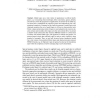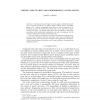345 search results - page 21 / 69 » Kripke models for classical logic |
KI
2008
Springer
13 years 7 months ago
2008
Springer
Abstract. Modal logics see a wide variety of applications in artificial intelligence, e.g. in reasoning about knowledge, belief, uncertainty, agency, defaults, and relevance. From ...
FOSSACS
1998
Springer
13 years 12 months ago
1998
Springer
Abstract. We propose a denotational semantics for the two-level language of [GJ91, Gom92], and prove its correctness w.r.t. a standard denotational semantics. Other researchers (se...
CORR
2008
Springer
13 years 7 months ago
2008
Springer
Abstract. Continuous first-order logic is used to apply model-theoretic analysis to analytic structures (e.g. Hilbert spaces, Banach spaces, probability spaces, etc.). Classical co...
PODC
2012
ACM
11 years 10 months ago
2012
ACM
This work presents a classification of weak models of distributed computing. We focus on deterministic distributed algorithms, and we study models of computing that are weaker ve...
ECSQARU
2005
Springer
14 years 1 months ago
2005
Springer
Abstract. Both in classical logic and in Answer Set Programming, inconsistency is characterized by non existence of a model. Whereas every formula is a theorem for inconsistent set...


